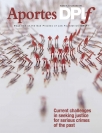In 2013, several important trials took place for crimes committed during the dictatorships in Latin America. These trials showed us, on one hand, that the investigation and punishment of those acts remain unfinished tasks in the region, and on the other hand, that national courts have become the new leaders in the fight against impunity. The central role of the victims and the organizations that support them must be given due recognition. At the same time, the genocide conviction of Efraín Ríos Montt in Guatemala and the decisions in the cases concerning extrajudicial executions at Barrios Altos and La Cantuta in Peru show us that, amid ups and downs, prosecutors and judges are willing to render independent decisions and use international law as a complement to domestic law in addressing the legal issues raised by the investigation and punishment of these types of crimes.
In order to bring attention to this evolution in judicial systems with respect to the serious crimes of the past, DPLF has conducted new research on Latin American case law over the past two years. The result is volume II of the Digest of Latin American Jurisprudence on International Crimes. This updated work examines new emblematic decisions, highlighting the debates that have arisen in constitutional and criminal law contexts and the innovative legal alternatives that have been created to deal with challenges such as the passage of time in evidence gathering and the high number of victims. The author of both volumes of the digest, Professor Ximena Medellín, shares her thoughts on these topics in this issue of Aportes.
As we will see in this issue, court cases involving acts of the past do not reflect the same degree of progress in every country, and in some places there have been significant setbacks. In the articles, well-known experts from the region take us from Guatemala to Argentina, reporting on the continuing challenges to transitional justice. Naomi Roht-Arriaza, professor of law at the University of California Hastings College of the Law and chair of DPLF’s Board of Directors, writes about the impact of the trial of Ríos Montt. Professor Juan Pablo Albán of San Francisco University in Quito discusses the efforts to bring cases from Ecuador’s Truth Commission to trial. Leonardo Hidaka reviews the issues faced in the trials from the dictatorship in Brazil; Carlos Rivera, of the Instituto de Defensa Legal in Lima, analyzes the significance of the trial of the perpetrators of the Barrios Altos massacre; and Gastón Chillier and Lorena Balardini, of the Centro de Estudios Legales y Sociales in Buenos Aires, share the recent advances in Argentina concerning sex crimes committed during the dictatorship. With regard to Colombia, the only country in Latin America with an ongoing armed conflict, we include articles that provide different perspectives on the scope and potential limits of the duty to prosecute grave human rights violations in the context of a possible peace process.
Although they present inconsistencies and reflect the structural weaknesses of national institutions, the cases examined in this edition of the journal are notable for various reasons. Not least, they represent an example for other regions of the world that are transitioning from anti-democratic regimes and debating the role of national justice in the prosecution and punishment of those responsible for grave human rights violations in the past.
We hope that these reflections are useful and, as always, we are grateful for any comments.






